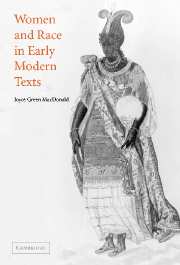Book contents
- Frontmatter
- Contents
- Acknowledgments
- Disclaimer
- Introduction: women, race, and Renaissance texts
- 1 Cleopatra: whiteness and knowledge
- 2 Sex, race, and empire in Shakespeare's Antony and Cleopatra
- 3 Dido and Sophonisba of Carthage: marriage, race, and the bonds between men
- 4 The disappearing African woman: Imoinda in Oroonoko after Behn
- 5 Race, women, and the sentimental in Thomas Southerne's Oroonoko
- 6 Chaste lines: writing and unwriting race in Katherine Philips' Pompey
- 7 The queen's minion: sexual difference, racial difference, and Aphra Behn's Abdelazer
- Conclusion: “The efficacy of Imagination”
- Bibliography
- Index
Conclusion: “The efficacy of Imagination”
Published online by Cambridge University Press: 22 September 2009
- Frontmatter
- Contents
- Acknowledgments
- Disclaimer
- Introduction: women, race, and Renaissance texts
- 1 Cleopatra: whiteness and knowledge
- 2 Sex, race, and empire in Shakespeare's Antony and Cleopatra
- 3 Dido and Sophonisba of Carthage: marriage, race, and the bonds between men
- 4 The disappearing African woman: Imoinda in Oroonoko after Behn
- 5 Race, women, and the sentimental in Thomas Southerne's Oroonoko
- 6 Chaste lines: writing and unwriting race in Katherine Philips' Pompey
- 7 The queen's minion: sexual difference, racial difference, and Aphra Behn's Abdelazer
- Conclusion: “The efficacy of Imagination”
- Bibliography
- Index
Summary
In Pseudodoxia Epidemica, Sir Thomas Browne goes to some lengths to deny the factual basis of the story about Phaethon that Shakespeare's Cleopatra invokes (in a deliberately misremembered form) as an explanation of the black skin she says she has. Clearly deeply interested in the question of the origins of the observable marks of racial difference, he also rejects the Biblical story about Noah's disobedient son Cham that George Best and others advanced as the master explanation of why some people in the world are black. For Browne, this story “is sooner affirmed than proved, and carrieth with it sundry improbabilities. For first, if we derive the curse on Cham, or in generall upon his posterity, we shall Benegroe a greater part of the earth than ever was, or so conceived” (330).
When it comes to advancing his own explanation of this natural phenomenon, he suggests a genetic explanation: “[W]ee may say that men became blacke in the same manner that some Foxes, Squirrels, Lions first turned of this complexion … All which mutations however they began, depend on durable foundations, and such as may continue forever” (328). But he also seems ready to reject scientific explanations altogether, suggesting instead that the origins of blackness lie in “the power and efficacy of Imagination, which produceth effects in the conception correspondent unto the phancy of the Agents in generation, and sometimes assimilates the Idea of the generator into a realty [sic] in the thing ingendred.”
- Type
- Chapter
- Information
- Women and Race in Early Modern Texts , pp. 164 - 168Publisher: Cambridge University PressPrint publication year: 2002



